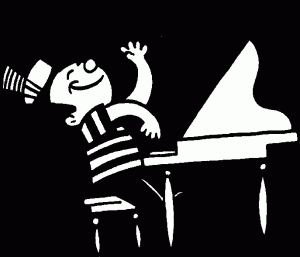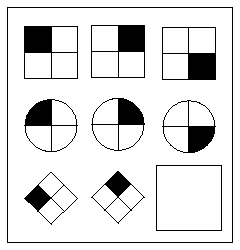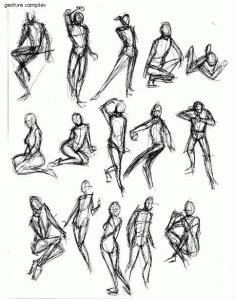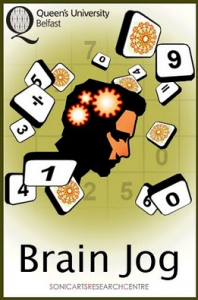Mental Training at the Edge but Not Over
 One reason video games are addictive is that the difficulty of play is automatically adjusted by how well you do. If you are scoring low the game becomes easier by dropping you down a level. Likewise if game play is too easy, the level of difficult increases and you are faced with a greater challenge. By dynamically adjusting the difficultly of play, you are always operating at “the edge of your seat” (or ability) and experience a rich sense of challenge and accomplishment.
One reason video games are addictive is that the difficulty of play is automatically adjusted by how well you do. If you are scoring low the game becomes easier by dropping you down a level. Likewise if game play is too easy, the level of difficult increases and you are faced with a greater challenge. By dynamically adjusting the difficultly of play, you are always operating at “the edge of your seat” (or ability) and experience a rich sense of challenge and accomplishment.
It seems that the same effect can improve brain training at least in older adults. Research reported by the Beckman Institute for Advance Science and Technology found that older adults stay engaged when the intellectual demands of a task optimally match their abilities. Furthermore they found that completing such tasks produced cognitive benefits.
“Stine-Morrow said that engagement in activities that are neither too easy nor too difficult, but push at the boundaries of one’s skill level, produces the highly pleasurable experience known as flow and that the experience of flow may be an important pathway through which older adults can stave off the declines in fluid ability that sometimes accompany aging.”
Intellectually challenging tasks include for example taking a class or reading. The key is to pick the one that keeps you in the optimal balance between challenge and reward. While the research is focused on older adults I suspect the effect works well at all ages.
I am interested to hear from readers that are able to brain train at the edge but not over. How do you adjust the difficulty level?
Source of Image: The Edge
Categories: Cognitive Decline, Lifestyle, Older Adult, Training Tags: experiential learning
Can Pulsed Light-and-Sound Enhance Your Brain?
 The idea behind mind machines is intriguing. They are simple devices that use pulsed sound and light to trick your brainwaves into certain patterns and put you in specific mental states such as relaxation or alertness. The question is do they really work?
The idea behind mind machines is intriguing. They are simple devices that use pulsed sound and light to trick your brainwaves into certain patterns and put you in specific mental states such as relaxation or alertness. The question is do they really work?
There is some scientific evidence that brainwave entrainment can have a therapeutic impact. There are a handful of small companies that manufacture and have sold mind machines for decades. Yet they remain on the fringe.
While I am not endorsing any specific product or company, you can learn more by checking out this video by the folks at Mind Alive. One of their mind machines (pictured to the right) runs about $500.
In the video they talk about how this technology delivers a “made to order mental state”. They also emphasize that given its ability to help manage stress it should be in every home. Perhaps if we had an iPhone or Droid app that turns a smart phone into a mind machine that will happen.
Very interested to hear from readers that use some form of mind machine. How long have you used it? What effects does it produce?
Categories: Mental Focus, Music and Audio, Other, Sleep Tags: Brainwave Entrainment
Use Tech to Manage Your 12,000 Daily Thoughts
 According to a widely quoted National Science Foundation Study, on average we have 12,000 thoughts per day. And it can run as many as 60,000 thoughts per day. I have been unable to locate the original study. No matter, we have all experienced the constant self talk and flow of ideas that make up everyday experience.
According to a widely quoted National Science Foundation Study, on average we have 12,000 thoughts per day. And it can run as many as 60,000 thoughts per day. I have been unable to locate the original study. No matter, we have all experienced the constant self talk and flow of ideas that make up everyday experience.
How do we mange so many ideas? Are there ways to manage our idea flow that will improve cognitive performance in decision making, self-regulation and creative problem solving?
Well known techniques for managing daily idea flow include journaling, keeping a notepad by your bed and other methods of trying to write them down. There is value in that but it is very low tech. Powerful but simple tools like Evernote, give us a way of quickly capturing our idea flow electronically (phone or computer) and relating it to other on-line documents and information.
The very act of documenting our idea flow slows it down and changes it. We may lose important notions. Fortunately, voice recognition technology has advanced to the point where we can reliably capture our thought by speaking to our phone or computer. Check out the Dragon line of naturally speaking products from Nuance. They have dictation and voice recognition products for every need including the iPhone dictation app shown below.
But will using technology to smoothly capture our thought flows improve our cognitive performance?
There is some evidence it does. For example, in the June 2011 issue of Wired, Clive Thompson argues in his story, Hold That Thought, that voice recognition technology may help us be more creative and over come mental challenges such as writer’s block.
From a general standpoint, having a transcript of all our thoughts in a given day could provide many insights. For example, we could identify patterns of self-talk that are negative or see bits of important ideas that might otherwise have been lost.
This summer I am planning to do some simple experiments at Northwestern University with students in my cognitive design class on capturing and analyzing daily though flows. I will blog the results. In the meantime, I am interested to hear from readers on how you capture daily thoughts and use that to improve cognitive performance.
Categories: Manage Emotions, Problem Solving, Software Tags: smart phone
Work With Friends to Build a Stronger Brain and a Better World
 Want to grow your Next Brain? Try GardenMind an intriguing new approach that combines cognitive training, social gaming with optional donations to the World Wildlife Fund (WWF).
Want to grow your Next Brain? Try GardenMind an intriguing new approach that combines cognitive training, social gaming with optional donations to the World Wildlife Fund (WWF).
Your mind is a garden and this metaphor is used to guide how you experience brain training. For example, you play memory games to grow deciduous trees and play language games to grow flowers. You can visit a friend’s garden to provide assistance or offer a friendly challenge. Best of all, contributing to WWF initiatives means animals visit and live in your garden.
Very interested to hear from readers that play GardenMind or are aware of similar brain training platforms.
Categories: Cognitive Development, Software, Training Tags: brain training, games
Music Lessons Offer Lifelong Cognitive Benefits
 Music is great for the brain in many ways. Learning to play a musical instrument is an excellent investment in improving brain function and cognitive performance. An interesting new study suggests that the brain boost we get from music lessons may last a lifetime. The study reported by the American Psychological Association examined the cognitive performance of adults (ages 60 t0 83) that studied music in childhood.
Music is great for the brain in many ways. Learning to play a musical instrument is an excellent investment in improving brain function and cognitive performance. An interesting new study suggests that the brain boost we get from music lessons may last a lifetime. The study reported by the American Psychological Association examined the cognitive performance of adults (ages 60 t0 83) that studied music in childhood.
“The high-level musicians who had studied the longest performed the best on the cognitive tests, followed by the low-level musicians and non-musicians, revealing a trend relating to years of musical practice. The high-level musicians had statistically significant higher scores than the non-musicians on cognitive tests relating to visuospatial memory, naming objects and cognitive flexibility, or the brain’s ability to adapt to new information.”
While these findings are tentative and require additional research, they do signal that musical training is a powerful tool for building your Next Brain.
Interested to hear from readers that were trained musically as children. How has that shaped your cognitive skills as an adult?
Categories: Child, IQ and EQ, Memory and Learning, Music and Audio, Older Adult, Perception, Problem Solving, Training Tags:
Get Some Mental Toughness on April 25th
 Mental toughness is the idea that we can train our brains to be in a higher state of readiness and more resilient to stress and challenges from the environment. The idea grew out of sports psychology where high performing athletes exert tremendous mental control and focus on demand and under great pressure. It is being applied in the US military and is the subject of dozens of books aimed at improving success in ordinary life.
Mental toughness is the idea that we can train our brains to be in a higher state of readiness and more resilient to stress and challenges from the environment. The idea grew out of sports psychology where high performing athletes exert tremendous mental control and focus on demand and under great pressure. It is being applied in the US military and is the subject of dozens of books aimed at improving success in ordinary life.
We have covered some of the techniques of mental toughness here in the Next Brain Blog. For those interested in learning more I recommend checking out the Mental Toughness Summit. This is a free on-line event that runs from April 25-29th. Some of the best names in the business are involved and it is sure to be loaded with specific ideas from improving brain function and cognitive performance. The host, Renita Kalhorn, will interview 12 leaders in the field. Attendees get to listen in as well as review recording of the interviews over a 24-hour period. There is also the option to upgrade to a premium service where you pay for an MP3 of the interviews.
I am going to attend as much as possible and will blog what I learn. I hope some readers are able to attend too and will share their insights.
Categories: Cognitive Development, Mental Focus, Training Tags:
Art Forms as Cognitive Enhancers?
 There is growing scientific evidence that experiencing art both passively and actively can improve brain function and cognitive performance. Art is used as a form of cognitive therapy with older adults and art training is advocated for children by some experts:
There is growing scientific evidence that experiencing art both passively and actively can improve brain function and cognitive performance. Art is used as a form of cognitive therapy with older adults and art training is advocated for children by some experts:
Michael Posner argues that when children find an art form that sustains their interest, the subsequent strengthening of their brains’ attention networks can improve cognition more broadly.
Experiencing art means experiencing beauty which is powerful emotive and intellectual stuff. There are many anecdotal claims that it enhances mental energy, creativity, improves focus and relieves stress.
Some readers of the Next Brain Blog (including myself) have reported success with a very simple art-based technique.
- Find an a new art form that deeply resonates with you. Mine turned out to be the work of Juri Morioka (see sample above).
- Acquire legal, affordable and high quality copies.
- Consciously experience it on a daily or frequent basis.
It is important to find a new art form, not one you have always liked. Also you may need to change the specific pieces you experience periodically to maintain the intensity of the cognitive effects.
Interested to hear from readers that use this or other art-based techniques to enhance brain function and cognitive performance.
Image source: Paintings by Juri Morioka
Categories: Child, Cognitive Decline, Cognitive Development, Lifestyle, Mental Focus, Older Adult, Perception Tags: art
Does Thinking Out Loud Boost IQ and EQ?
 When working on a difficult problem or puzzle people will sometimes begin to mutter or even talk out loud. When trying to resist a tempting piece of chocolate cake or deal with an emotional issue we can coach ourselves with positive self talk that sometimes happens aloud.
When working on a difficult problem or puzzle people will sometimes begin to mutter or even talk out loud. When trying to resist a tempting piece of chocolate cake or deal with an emotional issue we can coach ourselves with positive self talk that sometimes happens aloud.
Can talking to yourself out loud make you a better problems solver or more emotionally intelligent?
Common practice says yes. Unfortunately, it is not very clear on when the technique might work. Plus there is no scientific evidence to back the idea up, until now.
Came across a unique study, How to Gain Eleven IQ Points in Ten Minutes, that found talking aloud can help in some circumstances. The key finding:
“… older adults performed significantly better only on the Raven’s Matrices while thinking aloud. Performance gains on this task were substantial (d = 0.73 and 0.92 in Experiments 1 and 2, respectively), corresponding to a fluid intelligence increase of nearly one standard deviation.”
Raven’s Matrices are used as a test for general or fluid intelligence. An example question is shown to the above.
Also of interest are the negative findings:
- No improvements were shown by younger adults
- Older adults did not show improvement on other cognitive tasks such as memory tests, perceptual tests, solving puzzles and so on.
More research is needed but the positive finding is so strong it is worth considering as part of your Next Brain development efforts.
Interested to hear from readers that use talk aloud strategies to improve brain function and cognitive performance.
Source of Image: Wikipedia
Categories: IQ and EQ, Lifestyle, Older Adult Tags:
10 Proven Ways the Body can Boost the Brain
 How we use our bodies influences brain function and cognitive performance. Walking around to think out problems, gesturing with your hands to articulate a a complex point, smiling to feel happy, playing catch for a study break to enhance learning, taking a nap to supercharge problem solving and many other simple behaviors have scientific backing.
How we use our bodies influences brain function and cognitive performance. Walking around to think out problems, gesturing with your hands to articulate a a complex point, smiling to feel happy, playing catch for a study break to enhance learning, taking a nap to supercharge problem solving and many other simple behaviors have scientific backing.
Found a post on the PsyBlog, 10 Simple Postures That Boost Performance, that summarizes this effect well. The author tells you specifically what to do, why it works and then in some cases provides a link to a scientific study that backs it up.
This is a great way to get started in using your body to boost your brain. Don’t expect instant results. It takes some time and practice. You may want to read the supporting articles to get the details.
Very interested to hear from readers that use simple body-based techniques to improve cognitive performance.
Image Source: Blazedent
Categories: Lifestyle, Memory and Learning, Problem Solving Tags: embodied cognition
iPhone App Brain Training Experiment
 Researcher at Queen’s college worked closely with adults over 50 to develop four puzzles in a brain training app designed to improve brain health.
Researcher at Queen’s college worked closely with adults over 50 to develop four puzzles in a brain training app designed to improve brain health.
“Brain Jog is unique among similar apps in that it has come to fruition after extensive research and collaboration with the target audience to find out exactly what appeals to them. “By downloading this app, you can help us create a fantastic game experience for those over 50 and bring us one step closer to finding out whether or not brain training can help prevent cognitive decline and dementia.”
You can play Brain Jog on the iPhone, iPad or iPod. The four puzzles test and build cognition in spatial reasoning, working memory, arithmetic and verbal ability.
This is a good opportunity to get some free brain training and help shape the next version of the product.
Categories: Cognitive Decline, Software Tags: games, smart phone

